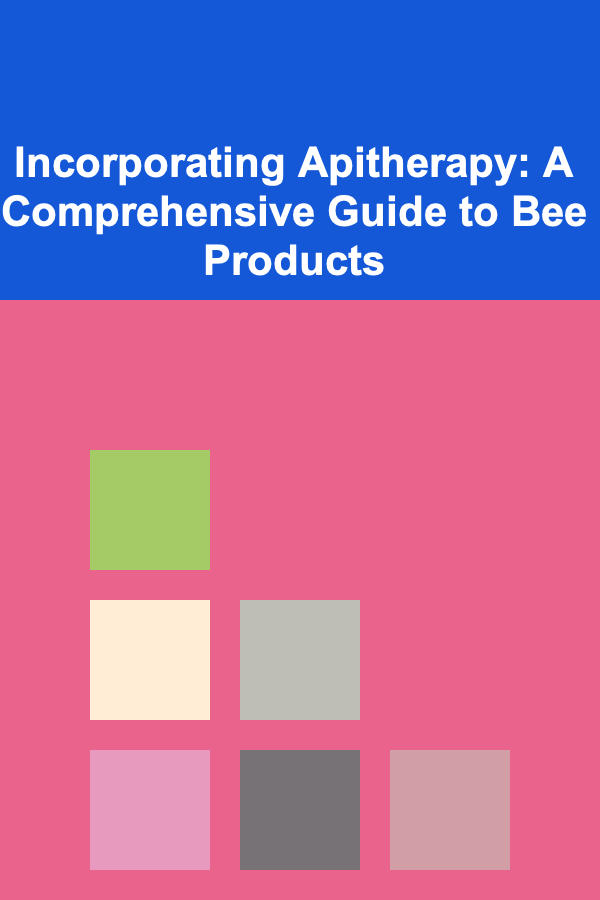
Incorporating Apitherapy: A Comprehensive Guide to Bee Products
ebook include PDF & Audio bundle (Micro Guide)
$12.99$10.99
Limited Time Offer! Order within the next:

Apitherapy, the therapeutic use of honeybee products, has a rich history spanning millennia. From ancient civilizations recognizing the healing properties of honey to modern research investigating the complex compounds within bee venom, propolis, and royal jelly, apitherapy offers a natural and holistic approach to health and wellness. This comprehensive guide explores the various bee products used in apitherapy, their potential benefits, considerations for safe use, and practical tips for incorporating them into your life.
Understanding the Core Bee Products
The power of apitherapy lies in the diverse array of products sourced from the honeybee (Apis mellifera) hive. Each product possesses a unique composition and potential therapeutic applications.
1. Honey: More Than Just Sweetness
Honey, the sweet nectar collected, modified, and stored by bees, is the cornerstone of apitherapy. Its composition varies depending on the floral source, climate, and bee species, leading to a wide range of flavors, colors, and, crucially, therapeutic properties. Beyond its simple sugars (fructose and glucose), honey contains enzymes, amino acids, vitamins, minerals, antioxidants (like flavonoids and phenolic acids), and antibacterial compounds like hydrogen peroxide and methylglyoxal (MGO).
Therapeutic Uses:
- Wound Healing: Honey's antibacterial and anti-inflammatory properties promote wound healing. Medical-grade honeys, particularly Manuka honey with high MGO content, are used to treat burns, ulcers, and infections. Its hygroscopic nature (drawing moisture out) can dehydrate bacteria and its acidity inhibits microbial growth.
- Cough Suppressant: Honey has been shown to be effective in relieving cough symptoms, particularly in children. It soothes the throat and reduces inflammation.
- Digestive Health: Honey may aid digestion by promoting the growth of beneficial gut bacteria. Its prebiotic effect nourishes these bacteria, contributing to a healthy gut microbiome.
- Allergy Relief: The "local honey" theory suggests that consuming honey produced in your region may help desensitize you to local pollen allergens. While scientific evidence is mixed, some individuals find relief.
Incorporating Honey:
- Daily Consumption: Use honey as a natural sweetener in tea, coffee, or yogurt. A tablespoon or two a day can provide a gentle boost of antioxidants and energy.
- Topical Application: Apply medical-grade honey directly to minor cuts, burns, or abrasions after cleaning the area.
- DIY Cough Syrup: Combine honey with lemon juice and warm water for a soothing cough remedy.
2. Bee Pollen: A Nutritional Powerhouse
Bee pollen is collected by worker bees from flower stamens and packed with nutrients. It is a complete protein source, containing all essential amino acids, as well as vitamins (including B vitamins, vitamin C, and vitamin E), minerals, enzymes, and antioxidants.
Therapeutic Uses:
- Energy Booster: Bee pollen is often touted as a natural energy booster due to its rich nutrient profile.
- Allergy Relief: Similar to honey, some believe bee pollen can desensitize individuals to local allergens. Start with very small doses to avoid allergic reactions.
- Immune System Support: The antioxidants and vitamins in bee pollen contribute to a healthy immune system.
- Prostate Health: Some studies suggest that bee pollen may improve symptoms of benign prostatic hyperplasia (BPH).
Incorporating Bee Pollen:
- Sprinkle on Food: Add bee pollen granules to yogurt, oatmeal, smoothies, or salads.
- Take as a Supplement: Bee pollen is available in capsule or tablet form.
- Start Slowly: Begin with a small amount (1/4 teaspoon) and gradually increase as tolerated to avoid allergic reactions.
3. Royal Jelly: The Queen's Secret
Royal jelly is a milky secretion produced by nurse bees to feed queen bee larvae. It is incredibly rich in nutrients, including proteins, amino acids, lipids, vitamins, minerals, and unique fatty acids, most notably 10-hydroxy-2-decenoic acid (10-HDA), believed to contribute to its therapeutic properties.
Therapeutic Uses:
- Anti-Aging Properties: Royal jelly is believed to have anti-aging effects due to its antioxidant content and ability to stimulate collagen production.
- Hormonal Balance: Some studies suggest that royal jelly may help regulate hormones and improve fertility.
- Cognitive Function: Royal jelly may improve cognitive function and memory due to its neuroprotective properties.
- Immune System Support: Like bee pollen, royal jelly contains nutrients that support the immune system.
Incorporating Royal Jelly:
- Sublingual Application: Royal jelly is often taken sublingually (under the tongue) for faster absorption.
- Capsule Form: It is also available in capsule form.
- Skincare Products: Royal jelly is sometimes incorporated into skincare products for its potential anti-aging benefits.
4. Propolis: The Hive's Protector
Propolis is a resinous substance collected by bees from tree buds and other botanical sources. They use it to seal cracks in the hive, providing protection against bacteria, fungi, and other pathogens. Propolis is rich in flavonoids, phenolic acids, and other antioxidants.
Therapeutic Uses:
- Antimicrobial Properties: Propolis has potent antibacterial, antiviral, and antifungal properties.
- Wound Healing: Similar to honey, propolis promotes wound healing and reduces inflammation.
- Immune System Support: Propolis strengthens the immune system and helps fight infections.
- Oral Health: Propolis is used in some oral hygiene products to fight bacteria and promote gum health.
Incorporating Propolis:
- Tincture: Propolis tincture can be taken orally or applied topically.
- Capsule Form: It is also available in capsule form.
- Throat Sprays: Propolis is often included in throat sprays for its antibacterial properties.
- Ointments and Creams: Propolis-containing ointments and creams can be used for wound healing and skin infections.
5. Bee Venom: A Powerful (and Potentially Risky) Therapy
Bee venom is a complex mixture of proteins, enzymes, and peptides that is injected by bees during stinging. While bee stings are often painful, controlled administration of bee venom (Bee Venom Therapy or BVT) is used to treat various conditions.
Therapeutic Uses:
- Pain Relief: Bee venom has analgesic properties and can reduce pain associated with arthritis, multiple sclerosis, and other conditions.
- Anti-Inflammatory Effects: Bee venom contains compounds that suppress inflammation.
- Immune System Modulation: BVT is believed to modulate the immune system, potentially helping to alleviate autoimmune diseases.
Incorporating Bee Venom:
- Bee Venom Therapy (BVT): This involves direct bee stings or injections of bee venom extract administered by a trained practitioner. This should ONLY be done under strict medical supervision.
- Bee Venom Creams and Ointments: Topical creams containing bee venom are available, but their effectiveness varies.
Important Warning: Bee venom can cause severe allergic reactions, including anaphylaxis. Bee Venom Therapy should only be administered by a qualified healthcare professional in a controlled environment with immediate access to emergency medical care. Always inform your doctor about any allergies you have, especially bee allergies. Do not attempt to self-administer bee venom.
Considerations for Safe and Effective Apitherapy
While apitherapy offers promising therapeutic benefits, it's crucial to approach it with caution and informed awareness.
1. Allergies: The Primary Concern
The most significant risk associated with apitherapy is allergic reactions. Individuals with bee allergies should avoid all bee products, as even small amounts can trigger a life-threatening anaphylactic reaction. Symptoms of an allergic reaction can include hives, itching, swelling, difficulty breathing, and dizziness. Seek immediate medical attention if you experience any of these symptoms after using bee products.
Even if you don't have a known bee allergy, it's wise to start with small doses of any new bee product to assess your tolerance. Perform a skin patch test before applying bee pollen or propolis topically. Apply a small amount to a discreet area of skin and wait 24-48 hours to see if any irritation or allergic reaction develops.
2. Quality and Sourcing
The quality of bee products varies widely depending on factors like sourcing, processing, and storage. Choose reputable brands that conduct third-party testing to ensure purity and potency. Look for certificates of analysis (COAs) that verify the absence of contaminants like pesticides, heavy metals, and antibiotics. Consider purchasing from local beekeepers who prioritize sustainable and ethical beekeeping practices.
For honey, opt for raw, unfiltered honey to preserve its natural enzymes and antioxidants. For bee pollen, choose pollen that is properly dried and stored to prevent spoilage. For royal jelly, ensure it is refrigerated or freeze-dried to maintain its freshness and potency.
3. Interactions with Medications and Conditions
Bee products can interact with certain medications and medical conditions. Consult with your doctor or a qualified healthcare professional before incorporating apitherapy into your routine, especially if you are taking medications for blood thinning, diabetes, or autoimmune diseases. Honey can affect blood sugar levels, so diabetics should monitor their blood glucose carefully. Propolis may interact with blood thinners, increasing the risk of bleeding. Royal jelly may stimulate hormone production and should be used with caution by individuals with hormone-sensitive conditions.
4. Dosage and Administration
Start with low doses of any new bee product and gradually increase as tolerated. Follow the recommended dosage guidelines on the product label or as advised by your healthcare provider. The optimal dosage can vary depending on your individual health status, the specific product, and the desired therapeutic effect.
Pay attention to how your body responds to bee products and adjust the dosage accordingly. If you experience any adverse effects, discontinue use and consult with your doctor.
5. Ethical Considerations
As with any natural therapy, it's important to consider the ethical implications of apitherapy. Support beekeepers who practice sustainable and ethical beekeeping methods that prioritize the health and well-being of the bees. Avoid purchasing bee products from sources that exploit bees or damage their habitats. Look for certifications like "Bee Friendly Farming" or "Organic" to ensure that the products are produced in an environmentally responsible manner.
Practical Tips for Incorporating Apitherapy
Here are some practical tips for incorporating apitherapy into your daily life:
- Start with Honey: Honey is the most accessible and versatile bee product. Use it as a natural sweetener, a wound healer, or a cough suppressant.
- Add Bee Pollen to Your Diet: Sprinkle bee pollen on your breakfast, lunch, or dinner for a nutritional boost.
- Consider Royal Jelly for Anti-Aging: If you're looking for anti-aging benefits, consider incorporating royal jelly into your routine.
- Use Propolis for Immune Support: Take propolis tincture or capsules to strengthen your immune system.
- Consult with a Healthcare Professional: Before starting any new apitherapy regimen, consult with your doctor or a qualified healthcare professional.
- Keep a Journal: Keep a journal to track your experiences with bee products and note any positive or negative effects.
- Be Patient: Apitherapy is not a quick fix. It may take time to see noticeable results.
The Future of Apitherapy
Apitherapy is a growing field of research with increasing interest in its potential therapeutic applications. Ongoing studies are investigating the mechanisms of action of bee products and exploring their effectiveness in treating a wide range of conditions, from chronic pain and inflammation to cancer and neurodegenerative diseases. The development of standardized bee product extracts and formulations is also underway, which will improve consistency and efficacy.
As research progresses and our understanding of bee products deepens, apitherapy is likely to play an increasingly important role in integrative and holistic healthcare. By combining traditional knowledge with modern science, we can harness the power of the honeybee to promote health and well-being.
Conclusion
Apitherapy offers a wealth of natural remedies derived from the remarkable honeybee. From the simple sweetness of honey to the complex compounds of bee venom, each product holds potential for promoting health and addressing various ailments. However, responsible and informed use is paramount. By understanding the potential benefits, risks, and ethical considerations, and by consulting with healthcare professionals, you can safely and effectively incorporate apitherapy into your life to support your overall health and well-being.
Disclaimer: The information provided in this article is for informational purposes only and does not constitute medical advice. Always consult with a qualified healthcare professional before starting any new treatment or making any changes to your current healthcare plan. Self-treating can be dangerous. The author and publisher are not responsible for any adverse effects resulting from the use of the information contained in this article.

Ace Your Next Job Interview: Common Questions and How to Answer Them
Read More
How to Declutter Your Home and Maintain a Minimalist Lifestyle
Read More
How to Declutter Your Home Before a Deep Clean
Read More
How to Stage Outdoor Spaces to Boost Your Home's Curb Appeal
Read More
How to Tackle Spring Cleaning Without Feeling Overwhelmed
Read More
Mastering Resource Management in Strategy Games
Read MoreOther Products

Ace Your Next Job Interview: Common Questions and How to Answer Them
Read More
How to Declutter Your Home and Maintain a Minimalist Lifestyle
Read More
How to Declutter Your Home Before a Deep Clean
Read More
How to Stage Outdoor Spaces to Boost Your Home's Curb Appeal
Read More
How to Tackle Spring Cleaning Without Feeling Overwhelmed
Read More